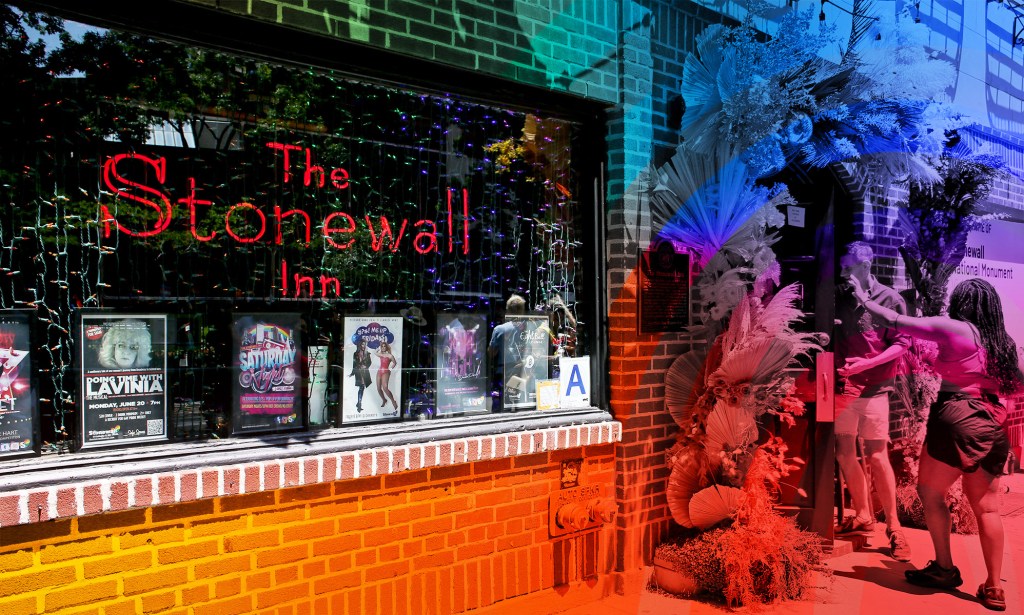
For this Pride Month, employers need to show other ways of celebrating their LGBTQ employees other than the basics. (Getty Images/PinkNews)
With Pride Month officially underway, businesses will be finalising their plans to celebrate and support their LGBTQ+ employees and colleagues. We share some suggestions on how to truly champion LGBTQ+ employees beyond the standard gestures of solidarity.
The month of June serves as a time when the entire LGBTQ+ community can unite and remember the progress made, all while addressing the ongoing issues that are impacting the community. As this year has already been plagued with hundreds of anti-LGBTQ+ laws and homophobic rhetoric in the news, Pride should also serve as a time to stand up and against the bigotry that has reared its ugly head.
For employers, Pride Month is low-hanging fruit when it comes to supporting LGBTQ+ employees, and the recent hasty retreats of brands like Target and Bud Light after their LGBTQ+ inclusive marketing efforts attracted bigoted hate are examples to brands and businesses of how not to handle Pride Month.
Offering honest support and a commitment to LGBTQ+ people at work goes beyond hanging some rainbow flags and putting on a Pride-themed event. While these are admirable gestures, LGBTQ+ employees value more than these surface-level actions.
To make an authentic difference and celebrate LGBTQ+ employees during Pride Month (and beyond), here is a list of meaningful ways employers can support their LGBTQ+ employees.

Update what is currently being done
Simple steps like encouraging the sharing of pronouns in emails and on name badges and offering gender-neutral bathrooms is a great starting points, but companies now need to refine and assess how inclusive those things are.
Do the company’s internal systems offer pronouns outside of the binary? If a colleague uses they/them pronouns then they should exist identically in HR documents. How accessible are those gender-neutral bathrooms? If a key is needed, then it may not be that accessible.
This approach also applies to the imagery that is on display throughout the workplace and in communications: If the company flying the Pride flag, consider updating it to the Progress Pride flag, which more explicitly represents queer people of colour, the trans community and intersex people.
Offer diversity training
Providing diversity training that specifically addresses LGBTQ+ issues can help educate employees and create a more inclusive workplace. Training like this increases awareness of unconscious biases, promotes respect and provides practical tools for fostering an inclusive environment.
When employers invest in ongoing diversity training, they are demonstrating their commitment to creating a broader atmosphere of understanding and acceptance throughout the year.
Re-examine benefits and how they are written
Nothing says “lack of inclusion” like employer benefits and policies that don’t reach everyone within the business. Benefits like family leave should reflect all the different ways families are created, such as through adoption or surrogacy. Employers should also double-check and make sure that all family leave is equitable rather than focused on the binary of maternal and paternal.
Regarding more complex experiences like gender-affirming care and transitioning, employers should be ready to support and advocate for their trans and non-binary employees where they can. Being this advocate could change internal policy and also influence medical providers to cover things like surgeries and hormone treatments.

Know the history of Pride
Given the political vitriol hurled at the LGBTQ+ community, now is a perfect time for businesses to be reminded why Pride is celebrated in June. Understanding the origins and significance of Pride is crucial for creating an inclusive environment. Employers can educate themselves and their employees about the Stonewall riots in 1969 and the struggles faced by the LGBTQ+ community throughout history.
By acknowledging and respecting this history, employers can foster empathy, awareness, and appreciation for the progress that has been made. It’s also key that employers are vocal themselves, and not put the onus to spread awareness on the shoulders of their LGBTQ+ employees.
Donate to charities that align with company goals
There’s no better way to show allyship than with a sizeable donation. With the help of employee resource groups (ERGs), companies can find charitable organisations that align with the company’s values and missions. If there is an employee-led fundraising campaign underway, companies can easily match employee donations.
Charitable donations are a win-win for the business. They are tax deductible and it’s another sign to LGBTQ+ employees that the company they work for is committed to LGBTQ+ inclusion outside of the workplace.

Let ERGs and employees lead the discussions
There is no gatekeeping in allyship, so business leaders should give the space to let LGBTQ+ ERGs and individuals drive the conversation around Pride. Employee-led groups can share their own experiences and what inclusion looks like to them. Companies with progressive benefits often utilise these volunteer-led networks to help shape and form those policies.
It’s important to note the difference between LGBTQ+ employees leading discussions and putting the responsibility for starting those discussions on them. Queer employees want the space, but shouldn’t have to create the space themselves. ERGs are more impactful when there is an executive sponsor that advocates for them.
Make resources readily available
Employers can go the extra mile by providing additional resources specifically aimed at supporting LGBTQ+ employees. This could involve creating an LGBTQ+ library or resource centre that offers books, articles, and educational materials.
Additionally, implementing mentorship programs or pairing LGBTQ+ employees with allies can provide invaluable support and guidance. These resources contribute to a sense of belonging, personal growth, and professional development among LGBTQ+ employees.
Stand up for what is right
Already this season, brands and businesses have succumbed to the backlash from the “anti-woke mob.”
From issuing public ‘apologies’ to taking down Pride retail displays, when businesses backtrack like this it severely impacts the LGBTQ+ community. It makes many in the community feel further isolated and it also encourages more hateful speech and discrimination towards LGBTQ+ people.
How did this story make you feel?